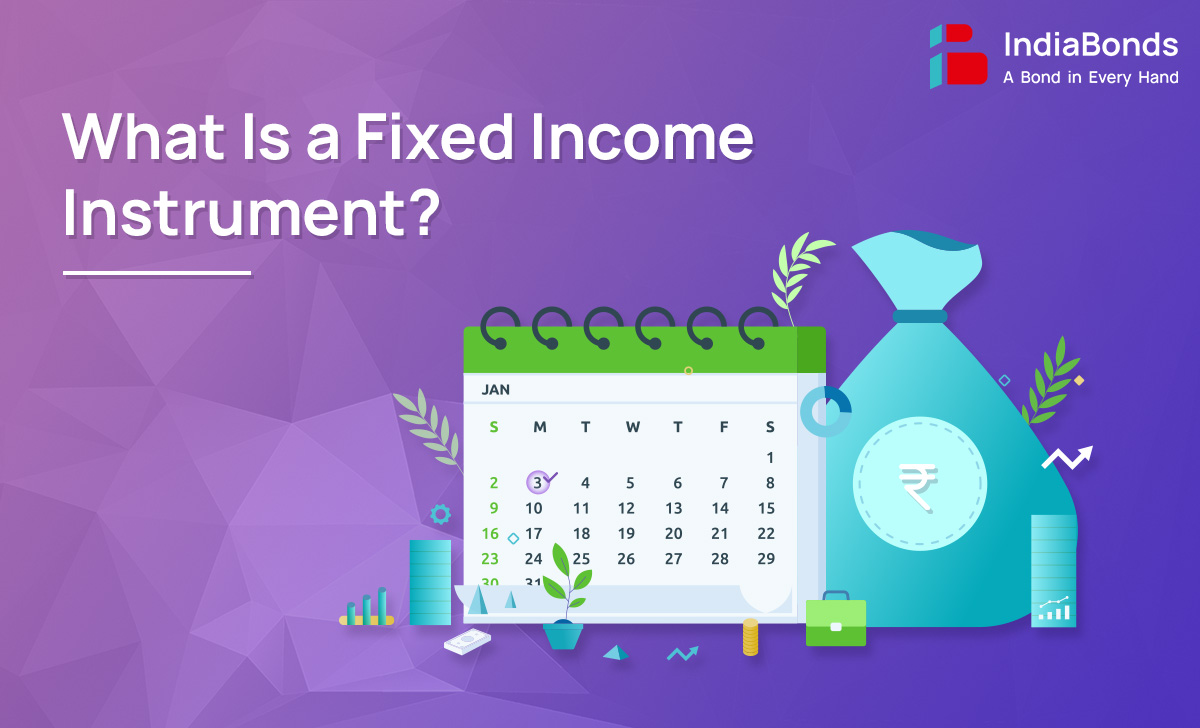What Is A Fixed Income Instrument

The meaning of fixed income securities in financial markets is as simple as the definition of the word itself – you get a prescribed income from this which is mostly fixed (decided) at the time of investment and when held till maturity of the instrument. For those of us who are interested in receiving a fixed income, this is the best form of investment. Moreover, fixed-income investing has become very easy nowadays. Many types of fixed-income securities are available online and we need to make sure that we pick the right fixed-income security that is suitable to our risk-return profile. If you are new to fixed-income investment, you have come to the right place. We will explain all about it in this blog.
What is Fixed Income?
Fixed income refers to certain investment securities which pay fixed interest payments till maturity. Normally, fixed income means investments, which are individual bonds that we buy and hold till maturity. We get interest payments on our fixed-income investments until maturity.
When the bonds mature, we are repaid the capital or principal amount that we have invested in fixed-income securities. We can know the payment of fixed-income security in advance. These payments, called interest, normally remain fixed throughout the life of the fixed-income security until its maturity.
How Does Fixed Income Work?
We invest our capital in fixed-income securities. Fixed-income securities are subject to less risk compared to equity securities, commodities or other illiquid assets. Fixed income normally includes government bonds, corporate bonds, municipal bonds, certificates of deposit, fixed deposits or saving certificates. We get a fixed set of income flows from fixed-income securities.
This fixed income is in the form of interest. Normally, we get interest payments at half-yearly or annual intervals every year, depending on the periodicity. There is also a class of fixed-income securities called zero-coupon bonds, which we can buy at a discount. For instance, if the maturity value is Rs 100 per bond, we may only pay Rs 91 at the time of purchase.
On maturity, we get Rs 100 at redemption. The difference between Rs 100 and Rs 91 is the interest component. Fixed-income securities can also have a fixed rate of interest or a floating rate of interest. In the case of corporate bankruptcy, fixed-income securities are ranked before equities.




Examples of Fixed Income Securities
Fixed-income securities include the following:
Certificate of Deposit (CD):
Certificate of Deposit (CD) is a fixed income instrument issued by a bank for a period which is less than 1 year. Generally, it comes with a maturity of 3 months, 6 months and 9 months. A high and fixed interest rate is what attracts more investors towards CDs. CD rate can be fixed or floating, in case of floating rate, the interest rate is to be reviewed at periodic pre-specified intervals. Usually, CDs are issued at a discount value and redeemed at face value and the interest is fully taxable in the hands of investors under the Income Tax Act.
Commercial paper:
Like CDs above, Commercial paper is issued by companies. Corporates issue commercial paper to raise capital for short-term requirements and working capital. Commercial paper has a maturity period of less than a year. Commercial papers are liquid instruments. They are promissory notes issued at a discount to par value similar to a zero-coupon bond.
Debentures:
Companies use debentures as a common source of long-term financing. We get a fixed rate of interest on debentures. We get higher interest rates on debentures compared to other short-term instruments. Debentures form a part of the capital structure of the company. They are included in the debt capital or liabilities portion of the balance sheet. They are also called bonds.
Bonds:
Bonds are issued by governments, banks and companies. They pay a fixed coupon payment with multiple interest payment frequency which can be monthly, quarterly, semi-annual, annual or cumulative. Normally, Corporate bonds are secured by a charge on the company’s assets. The tenor of bonds can be from two to 30 years. The interest rate we get on bonds can be fixed or floating. Bonds provide a much higher interest rate and income than fixed deposits. Bonds are liquid instruments and are traded on exchanges.
Government securities or bonds:
A government security is a tradable instrument issued by the Central Government or by the State Governments and is acknowledged as Government’s debt obligation. Government securities carry practically no risk of default and are risk-free fixed income instruments. These securities are short-term (treasury bills with original maturity of less than one-year) or long-term securities (Government bonds or other dated securities issued by State Governments with original maturity of one-year or more).
Debt mutual funds:
They are mutual funds which invest in all types of fixed-income securities which are listed above. Here investor gets interest depending on performance of the fund and after deducting management and other operating expenses. The interest is not guaranteed and varies based on overall funds management. Debt Mutual funds mostly invest in the debt instruments which may include G-secs, CPs, CDs, State government securities and corporate bonds.
Money market funds:
These are mutual funds which mainly invest in treasury bills, commercial paper and certificates of deposit. They are good for introducing liquidity in the portfolio by investing for the short term. We can park our temporary funds in money market instruments.
Public provident fund:
It provides tax exemptions. It is a Central government-sponsored scheme on which we can earn relatively high returns.
Senior citizens savings scheme:
These are fixed-income savings schemes provided mainly to senior citizens by the Ministry of Finance with a relatively higher return.
Municipal bonds:
Municipal bonds are normally issued by municipalities as a part of their capital-raising exercise. This is normally done to fund the various city projects. They pay an attractive fixed rate of interest and also have low credit risk.
Benefits of Fixed Income Securities:
Here are the benefits of fixed-income security:
- Fixed-income securities help us diversify our investments from stock market risk. Fixed-income securities help us invest in assets which are negatively correlated with stock markets. This helps us to potentially offset losses when stock markets are in a downturn.
- Fixed income securities have the stated objective of return of our principal. They help us preserve our capital. We may be investors who are close to retirement or already retired. In this case, it helps to make a greater allocation of our portfolio to fixed-income securities.
- Fixed-income securities provide steady income. We receive a regular source of income from these investments. They are subject to less risk compared to equity investing.
- Fixed income also has the potential to generate an attractive total return. When we take on more credit risk or interest rate risk, we can enhance our returns.
Risks of Investing in Fixed-Income Securities
Like every other type of investment, fixed-income securities also come with certain risks. They are:
· Interest rate risk
When market interest rates rise, bond prices fall. When market interest rates fall, bond prices rise. Fixed-income securities and market interest rates have an inverse relationship. Changes in market interest rates cause a lot of fluctuations in fixed-income prices. Investing in floating rate bonds helps to mitigate this risk.
· Credit risk
When we invest in corporate bonds, they carry credit risk in addition to interest rate risk. Credit risk is also known as business risk or financial risk. This is the possibility that the issuer may default on the payment of principal and interest. In such a case, the investor will not receive his full payment.
· Reinvestment risk
This is another risk for fixed-income investors. Here we may not be able to deploy income at the same level of rate that we invested at the beginning. For example if you invest in a bond at 10% for 2 years, at maturity you may not be able to reinvest the principal again at 10% as this is dependent on market conditions at that time.
· Liquidity risk
Liquidity risk is the risk that when we want to sell fixed-income security, we are unable to find a buyer at the appropriate price. Even if we find a buyer, the price he offers is at a tremendous discount to our purchase price. This is because of illiquid market conditions.
Key Takeaways
Our portfolio must have an allocation of fixed-income assets. They provide a steady return and are not subject to volatility like equities. Our principal is returned to us on the maturity date. As our portfolio and list of assets grow, we must consider our investment options. Our investment strategies should increase our portfolio allocation to fixed income. We can easily buy fixed-income securities both offline and online. Visit IndiaBonds to know more about online bond trading.
FAQs
1) Is interest in fixed-income securities taxable?
Yes, interest on fixed-income securities is taxable
2) Is there a risk that a bond will default?
If it is a corporate bond, there is a risk that the issuer will default.
3) Can you buy bonds online?
Yes you can buy Bonds Online. In case you are looking to invest in bonds online, you can do so in 3 simple steps. Simply sign up on IndiaBonds.com. Complete your KYC in under 3 mins. The process is simple, paperless and requires no uploads. Lastly, select the bond of your choice from a curated list of bonds under the Explore page and invest in minutes. In case you have any queries, you can reach out to us and our bond managers would be happy to assist you in your investment journey.
Disclaimer: Investments in debt securities/ municipal debt securities/ securitised debt instruments are subject to risks including delay and/ or default in payment. Read all the offer related documents carefully.













































